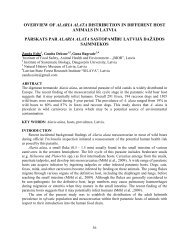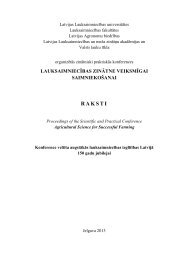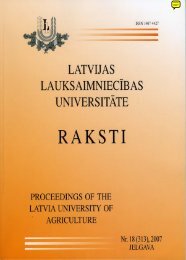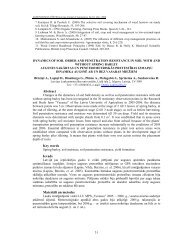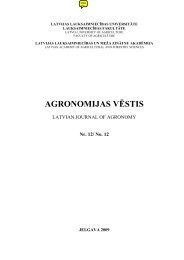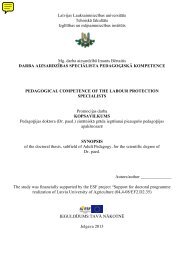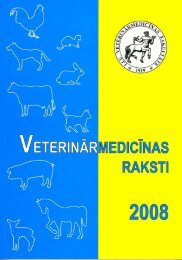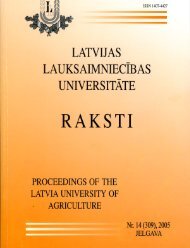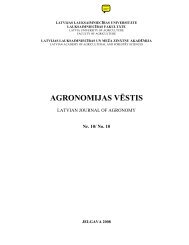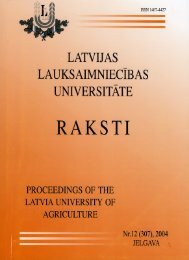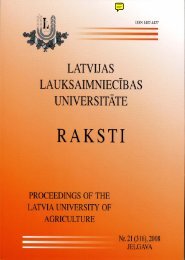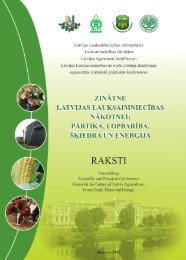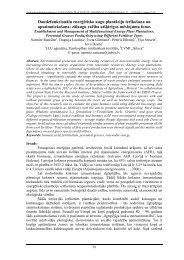Latvia University of Agriculture - Latvijas Lauksaimniecības ...
Latvia University of Agriculture - Latvijas Lauksaimniecības ...
Latvia University of Agriculture - Latvijas Lauksaimniecības ...
Create successful ePaper yourself
Turn your PDF publications into a flip-book with our unique Google optimized e-Paper software.
A. Kusta Development <strong>of</strong> cooperation between agricultural science andresearch institutions in <strong>Latvia</strong>, Lithuania and EstoniaDevelopment <strong>of</strong> cooperationbetween agricultural science and research institutionsin <strong>Latvia</strong>, Lithuania and EstoniaA. KustaLithuanian <strong>University</strong> <strong>of</strong> <strong>Agriculture</strong>Honorable doctor <strong>of</strong> <strong>Latvia</strong> <strong>University</strong> <strong>of</strong> <strong>Agriculture</strong>Lithuania, <strong>Latvia</strong> and Estonia, for long centuries being near the Baltic Sea werefriendly living together and never standing against each other, fought with the aliensfrom elsewhere if they were attempting to their freedom. Often they are called with onename - the Baltic Countries. It was <strong>of</strong> such historical periods when they weren’t calledthe countries but carried the name <strong>of</strong> territories, regions or province. With great joytoday we remember the Baltic way when people built 600 km length circuit connectingthe three countries named “Baltic Way” firmly saying the whole world that we want to befree and self-build our future. This year is famous for us with various anniversaries andthe jubilee: the recent mentioning <strong>of</strong> twenty years <strong>of</strong> unique phenomenon - the BalticWay, Lithuania celebrates the millennium <strong>of</strong> the mentioning <strong>of</strong> it’s name, Lithuanian<strong>University</strong> <strong>of</strong> <strong>Agriculture</strong> turns to 85 years old, and today <strong>Latvia</strong> <strong>University</strong> <strong>of</strong> <strong>Agriculture</strong>points out a worthy 70-year anniversary. This is a big celebration not only for all your<strong>University</strong> staff, students, graduates maintaining the honourable and beautiful traditions,but also for <strong>Latvia</strong> because <strong>University</strong>’s graduates are spread all the country and workingin agriculture and other strategic state economy spheres. It is also a big celebrationfor us - your neighbours. We welcome your work which commemorates the work donetogether and the pleasant moments spent together....I would like to mention a few moments <strong>of</strong> our cooperation, which have been inthe past and where I had directly participated. The increased cooperation began in theSoviet period. It took place among agrarian universities (academies at that period) <strong>of</strong>three Baltic countries, and was from a more massive scale. Regular meetings took placebetween related departments but the staffs <strong>of</strong> Faculties <strong>of</strong> Economics gathered in oneplace at the same time. The meetings <strong>of</strong> departments were held annually or biennially.Meetings were helpful in various aspects: methodological, scientific, communication,personal networking and even political.I am a hydraulic engineer, in accordance with European classification attached to thetrend <strong>of</strong> Environmental Engineering and Landscape Architecture. So we communicatedat the Hydraulic departments’ level. Cooperation between the departments <strong>of</strong> otherspecialties was a bit different but they were minor. The names <strong>of</strong> the departmentswere differ, but rather well met to the assigned subjects (they were coordinated froma centre in Moscow and was allowed only very minor deviations taking into accountregional conditions), so the division <strong>of</strong> the methodological and scientific experiencewent very businesslike. During the Soviet period the intensive work took place towardsthe extending <strong>of</strong> material base, equipping <strong>of</strong> laboratories and the discussions duringthe meetings mainly contained the problems <strong>of</strong> design, construction and operation <strong>of</strong>research equipment and experience <strong>of</strong> daily work. The results were obvious learnedfrom experience accumulated by neighbours and therefore turned to better equipping <strong>of</strong>home laboratories. Some tasks were performed by one party, some - by the other andthe benefits were not one-sided. Communication was a win-win.The benefits from communication and personal relations in the meaning <strong>of</strong> cooperationdevelopment were <strong>of</strong> the same importance as methodical or scientific one. We perfectlyknew our counterparts in <strong>Latvia</strong> and Estonia, the meetings brought us closer together, andwe made friends and have become a family <strong>of</strong> the international hydraulic specialists. Theconfidence in each other gradually gained, and colleagues <strong>of</strong> our three countries realisedhaving unanimous opinion to one very important question - approach to the so called“strong centre” in Moscow. “Strong Centre” was very unpopular because it’s dun andniggling regulation not only in the learning process, but in general was very unwelcome.It <strong>of</strong>ten became the object <strong>of</strong> criticism, perhaps more accurate to say ridicules jokes andthe object <strong>of</strong> personal interviews at the receptions. Since none <strong>of</strong> us fall to the reach <strong>of</strong>KGB it can be argued that staff <strong>of</strong> our Hydraulic departments didn’t include the agents154 <strong>Latvia</strong> <strong>University</strong> <strong>of</strong> <strong>Agriculture</strong> – 70, 2009



